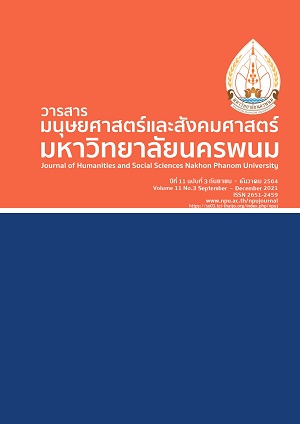Developing Khaokho Green Accommodation Framework
Main Article Content
Abstract
The research aimed to study the environmental-friendly operation of accommodations and to propose a framework of Green Khaokho Accommodation Standard, Khaokho district, Phetchabun Province. In order to achieve the objectives, the research adopted a qualitative research approach. The research populations were accommodation entreprises, representatives from public and private sector and experts in the field. The sampling employed mix-purposeful sampling approach which combined criterion sampling and convenience sampling method. The participant observation with a check-list form was carried onsite in 23 accommodations meanwhile 23 entrepreneurs, 12 representatives of local organizations and experts were interviewed face-to-face and telephone interview. The data analysis was conducted using content analysis for interview data and frequency and percentage were analysed for check-list form. The findings revealed 1) majority of accommodation in Khaokho practiced in environmental-friendly operation that aligned with green accommodation standard. Some problems and obstacles were concerned such as personnel potentiality in environmental management, cost and investment and waste management of the public sector. 2) a framework of Green Khaokho Accommodation Standard was proposed with 5 criterions and 25 attributes such as managing and reducing environmental impact (5 attributes), waste and solid waste management (5 attributes), energy management (6 attributes) water management (4 attributes) and involvement with local authorities and communities (5 attributes). This proposed framework can be a guideline for managing green accommodation. As well as, the local government enable to use the framework for promoting the green businesses and green accommodation.
Article Details
References
ASEAN Public Relation Center.(2019) retrieved from asean.net http://www.aseanthai.net/main.php?filename=index
Association of Southeast Asian Nations. (2015). Asean Green Hotel Standard. Retrieved from www.asean.org:http://www.asean.org/wp-content/uploads/2012/05/ASEAN-Green-Hotel-Standard.pdf.
Braun, V., & Clarke, V. (2006). Using thematic analysis in psychology. Qualitative Research in Psychology, 3(2), 77–101.
Cekanavicius, L., Bazyte, R., & Dicmonaite, A. ( 2014). Green Business: Challenges and Practices, Ekonomika, 39(1), 74-88.
Chen, M.-F., & Tung, P-J. (2014). Developing an extended Theory of Planned Behavior model to predict consumers’ intention to visit green hotels. International Journal of Hospitality Management, 36 (Supplement C), 221-230.
Chinwetkitvanich, S., Prachakasaem, W., & Ruchiraset, A.(2019). rōngrǣm sīkhīeo : kān rirœ̄m khō̜ng phāk rat phư̄a rōngrǣm thī pen mit kap singwǣtlō̜m [Green Hotels: Governmental Initiatives for Environmentally Friendly Hotels]. Thai Environmental Engineering Journal, 32(2) p. 61-70. [in Thai]
Gibson, A., Dodds, R., Joppe, M., & Jamieson, B. (2003). Ecotourism in the city? Toronto’s Green Tourism Association. International Journal of Contemporary Hospitality Management, 15, p.6.
Green Economic Report 2018-2019 (2019) retreived 20 August 2019 from https://progreenecon.files.wordpress.com/pdf
Green Globe. (1992). Standard Criteria and Indicators. Retrieved 18 January 2018, from https://greenglobe.com/
Green Leaf sustainability services. (2007). Green Leaf Sustainability Services. Retrieved 18 January 2018, from http://glsss.net/
Green Leaf sustainability services. (2007). The History of Green Leaf Sustainability Services. Retrieved 18 January 2018, from http://glsss.net/history/
Green Tourism Canada. (2014). What Is Green Tourism? Retrieved 17 November 2017: http://www.greentourismcanada.ca/works/
Green Tourism Thailand. (2008). How to be 7 Green. Retrieved 20 December 2017 https://7greens.tourismthailand.org/
Kis-Orloczki, M. (2012). Eco-labelling for environmental friendly hotel industry. Conference Paper. University of Miskolc. Retrivered from https://www.researchgate.net/publication/263535217:
Laroche, M., Bergeron, J., and G. Barbaro-Forleo. (2001). Targeting consumers who are willing to pay more for environmentally friendly products. Journal of Consumer Marketing, p. 503-520.
Lee, S.-M., Honda, H. C., Ren, G., & Lo, Y.-C. (2016). The Implementation of Green Tourism and Hospitality. Journal of Tourism & Hospitality, 5, p.4. doi: 10.4172/2167-0269.1000233
Lee, W.-H., & Cheng, C.-C. (2018). Less is more: A new insight for measuring service quality of green hotels. International Journal of Hospitality Management, 68, 32-40.
Miles, M B. & Huberman, A M. (1994). Qualitative Data Analysis. An Expanded Sourcebook (2nd ed.). Thousand Oaks,CA: Sage.
Ministry of Tourism and Sport of Thailand. (2019). Tourist Statistic 2018. Retrieved 20 January 2020, from https://www.mots.go.th/more_news_new.php?cid=497
Nagy, A. (2017). What Is Green Tourism? Retrieved 25 November 2017, from www.greentourismcanada.ca https://www.greentourismcanada.ca/works/
Nastasi, B. K. and Schensul, S. L. (2005). Contributions of qualitative research to the validity of intervention research, Journal of School Psychology. 43(3), 177-195.
Nilsson, P., Jorn, B. (2012), Green business model innovation in the tourism and experience economy Cases from Austria, Portugal, Denmark, Finland, Mexico, Norway, Sweden, Iceland, Russia and South Korea, Nordic Innovation Publication, Retrieved 1 December 2017, http://www.nordicinnovation.org/Global/_Publications/Reports/2012/2012
Narongrit, C., Nonsiri, P., Harfield, A., & Rukngarn, J., (2017) kānphatthanā kānrīanrū khō̜ng khrư̄akhāi khwāmrūammư̄ thāng kasēttrakam chœ̄ng phư̄nthī phư̄a sāng phāplak kānthō̜ngthīeo sīkhīeo naiʻō̜ khao khō̜ čhangwat phet būrana [The development of Learning Process in agricultural network for enhancement Green Tourism in Khaokho district, Petchabun Province] Research Report. [in Thai]
Nezakati, H., Hosseinpour, M., (2015). Green Products Purchasing among Maalasia consumers, International Journal of Sustainable Development and World Policy, 4(1), p.1-6.
Nonsiri, P., Norongrit, C. (2018). patčhai khwāmsa ret khō̜ng kāndō̜ nœ̄n ngān nai rūpbǣp khrư̄akhāi khwāmrūammư̄ phư̄a songsœ̄m kānthō̜ngthīeo sīkhīeo ʻō̜ khao khō̜ čhangwat phet būn [The Key Success Factors of Collaborative Network for Enhancing Green Tourism in Khao Kho District, Phetchaboon Province]. Journal of Southern Technology, 11(2), p. 15-26. [in Thai]
Sutheewasinnon, P., Pasunon, P. (2016). konlayut kānlư̄ak tūayāng samrap kānwičhai chœ̄ng khunnaphāp[Sampling Strategies for Qualitative Research]. Parichart Journal, 29(2), p.31-48. [in Thai]
Tsaur, S.-H., Yu-Chiang, L., Jo-Hui, L. (2006). Evaluating ecotourism sustainability fromthe integrated perspective of resource, community and tourism. Tourism Management, 27, 640–653. https://doi.org/10.1016/j.tourman.2005.02.006
Van Bueren, E. M. L., Blom, E. M. (1997). Hierarchical Framework for the Formulation of Sustainable Forest Management Standards. Wageningen: Tropenbos Foundation


